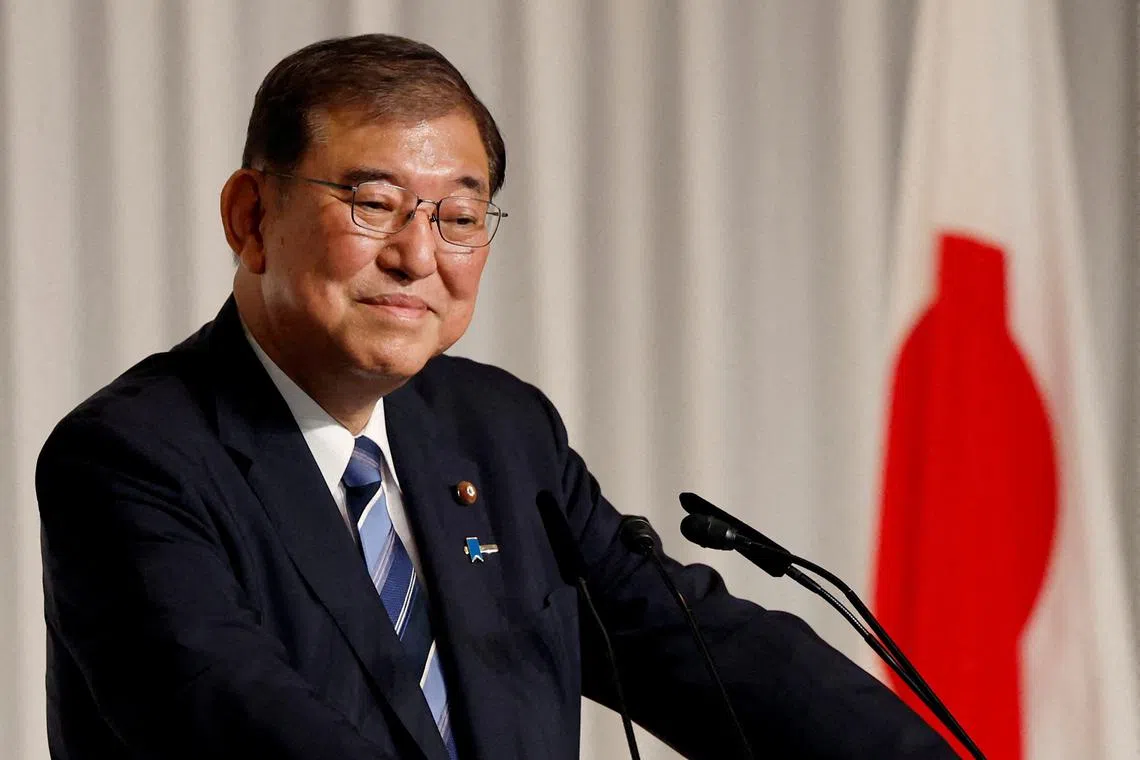Ishiba becomes Japan’s PM and announces Cabinet line-up, which includes 2 women
Sign up now: Get insights on Asia's fast-moving developments

Japanese Prime Minister Shigeru Ishiba said he intended to call a general election for Oct 27.
PHOTO: REUTERS
TOKYO – Mr Shigeru Ishiba became the Japanese Prime Minister
Mr Ishiba, 67, said he intended to call a general election for Oct 27. He won a tight race on Sept 27 to lead the Liberal Democratic Party (LDP), which has governed almost constantly for decades.
Japan’s Parliament, where the LDP has a majority, approved Mr Ishiba’s appointment on Oct 1, and it was followed by the announcement of his Cabinet line-up, whose 19 ministers included two women.
Former chief Cabinet secretary Katsunobu Kato was named finance minister, while Mr Gen Nakatani took defence and Mr Takeshi Iwaya took foreign affairs.
Mr Ishiba, who has held at least three previous ministerial posts, is a self-confessed defence “geek” who tried and failed four times before to become LDP leader.
He finally succeeded this time because, while a divisive figure within the party, he is – unlike predecessor Fumio Kishida
Mr Ishiba’s win “indicates that the LDP sought an experienced leader with broad voter appeal to steer the party in the next national election”, said Ms Yuko Nakano of the Centre for Strategic and International Studies.
“If the ruling coalition secures a fresh mandate (in the election), Ishiba will have the opportunity to reshape the party’s internal dynamics and restore public confidence, while addressing Japan’s broader challenges, including economic stagnation felt by many voters and regional security concerns,” she said.
Tumbling stocks
Markets, however, have reacted negatively, with the Nikkei plunging almost 5 per cent on Sept 30. On Oct 1, the index recovered some ground and closed up 1.9 per cent.
Mr Ishiba’s backing of interest rate hikes by the Bank of Japan has sent the yen higher, while the prospect of corporate tax hikes has worried investors.
One major area of government spending involves the military. Former Japanese prime minister Kishida had undertaken to double defence spending, and boost ties with the United States and other countries rattled by China’s rise, and the behaviour of Russia and North Korea.
Last week, a Japanese warship sailed through the Taiwan Strait
Japan has also scrambled fighter jets on multiple occasions in recent weeks to respond to activity by Russian and Chinese aircraft, including in its airspace.
Mr Ishiba, who visited Taiwan in August, backs the creation in the region of a military alliance along the lines of Nato with its tenet of collective defence.
“Replacing Russia with China and Ukraine with Taiwan, the absence of a collective self-defence system like Nato in Asia means that wars are likely to break out because there is no obligation for mutual defence,” Mr Ishiba said in a recent policy paper. AFP


